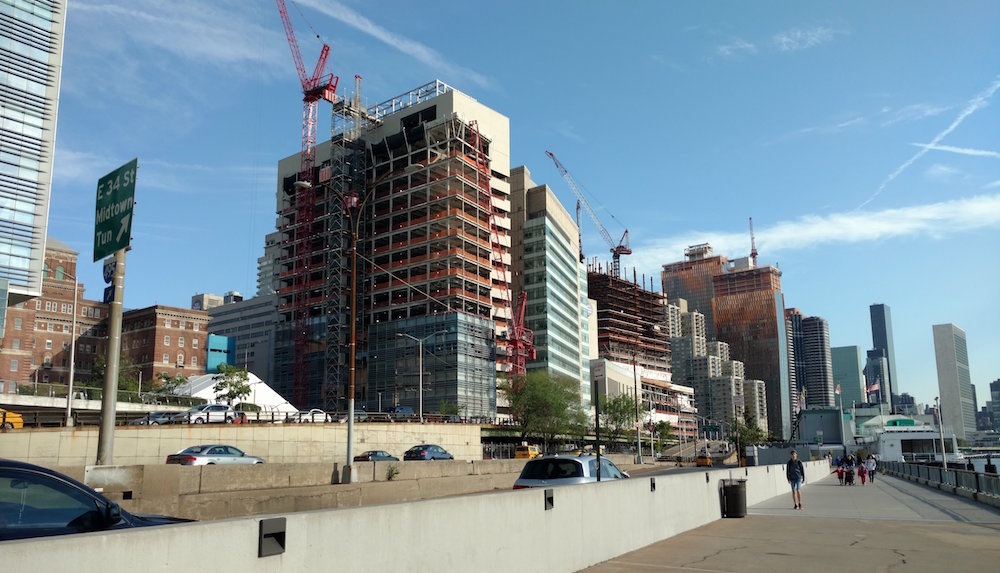The American Institute of Architects (AIA), National Institute of Building Sciences (NIBS) and 38 other leaders of America’s design and construction industry, released a report this week on progress made on the resilience front since the Resilience Building Coalition announced the Building Industry Statement on Resilience two years ago.
The Resilience Building Coalition also released a set of guiding principles to help the building industry adopt resilient design and policies. These include developing and advocating for codes and policies that advance resilience; developing “whole-systems resilient design” approaches for the built environment; and providing guidance, beyond the baseline life-safety codes, that recognizes the importance of fortifying property for individual and community resilience. Since the initial signing, the Coalition has added 19 new signatories, listed below.
The report includes results from a survey of signatories about how their work has been impacted by the Building Industry Statement on Resilience. Among the survey’s major findings:
- A majority of signatories report that they have “become more aware of their unique role in achieving resilience” since committing to the statement, which has clearly catalyzed the integration of resilience goals into existing organizational frameworks.
- Almost 30% of respondents have seen an increase in resilience as a priority within their organizations.
- More than two-thirds of respondents listed high-performance buildings as an initiative they were most interested in advancing.
- More than half of the responding signatories have used the Statement to “advance their organizational mission statement/values,” as well as “provide support and/or validation for moving forward on organization initiatives.” This shift in organizational priorities has led to concrete action.
- Respondents reported more than 40 initiatives they have begun that support the resilience focus areas committed to in the Statement.
The report is an outgrowth of a landmark agreement made in May 2014, in which leaders of America’s design and construction industry agreed to promote resilience in contemporary planning, building materials, design, construction and operational techniques as the solution for making the nation’s aging infrastructure more safe and secure.
“Resilient design places architects at the center of the solution, with particular emphasis on the private, non-governmental sectors," said American Institute of Architects CEO Robert Ivy, FAIA. “I would like to congratulate my fellow leaders in the design and construction sector for joining together to make sure resiliency is not viewed as just a fad but remains front and center in our efforts moving forward.”
The list of organizations that have signed the joint statement on resilience is as follows (new organizations are marked with an asterisk):
- The Air Barrier Association of America*
- American Council of Engineering Companies
- American Institute of Architects
- American Planning Association
- American Society of Civil Engineers
- American Society of Interior Designers
- American Society of Landscape Architects
- American Society of Plumbing Engineers
- American Wood Council*
- ASHRAE
- Associated Builders and Contractors
- Associated General Contractors of America
- BuildStrong Coalition*
- Building Owners and Managers Association
- Congress for New Urbanism*
- Concrete Reinforcing Steel Institute*
- Construction Specifications Institute*
- EcoDistricts*
- Federal Alliance for Safe Homes*
- Green Building Initiative*
- Illuminating Engineering Society*
- Insurance Institute for Business & Home Safety*
- International Association of Plumbing and Mechanical Officials*
- International Code Council
- International Facility Management Association
- International Interior Design Association
- Lean Construction Institute
- National Association of Home Builders
- National Association of Mutual Insurance Companies*
- National Concrete Masonry Association*
- National Fire Protection Association*
- National Institute of Building Sciences
- National Insulation Association*
- National Ready Mixed Concrete Association*
- National Society of Professional Engineers
- Portland Cement Association*
- Royal Institution of Chartered Surveyors
- US Green Building Council
- U.S. Resiliency Council*
- Urban Land Institute
Related Stories
Sustainability | Apr 10, 2023
4 ways designers can help chief heat officers reduce climate change risks
Eric Corey Freed, Director of Sustainability, CannonDesign, shares how established designers and recently-emerged chief heat officers (CHO) can collaborate on solutions for alleviating climate change risks.
Cladding and Facade Systems | Apr 5, 2023
Façade innovation: University of Stuttgart tests a ‘saturated building skin’ for lessening heat islands
HydroSKIN is a façade made with textiles that stores rainwater and uses it later to cool hot building exteriors. The façade innovation consists of an external, multilayered 3D textile that acts as a water collector and evaporator.
Resiliency | Apr 4, 2023
New bill would limit housing sprawl in fire- and flood-prone areas of California
A new bill in the California Assembly would limit housing sprawl in fire- and flood-prone areas across the state. For the last several decades, new housing has spread to more remote areas of the Golden State.
Sponsored | Cladding and Facade Systems | Mar 15, 2023
Metal cladding trends and innovations
Metal cladding is on a growth trajectory globally. This is reflected in rising demand for rainscreen cladding and architectural metal coatings. This course covers the latest trends and innovations in the metal cladding market.
Student Housing | Mar 13, 2023
University of Oklahoma, Missouri S&T add storm-safe spaces in student housing buildings for tornado protection
More universities are incorporating reinforced rooms in student housing designs to provide an extra layer of protection for students. Storm shelters have been included in recent KWK Architects-designed university projects in the Great Plains where there is a high incidence of tornadoes. Projects include Headington and Dunham Residential Colleges at the University of Oklahoma and the University Commons residential complex at Missouri S&T.
Seismic Design | Feb 27, 2023
Turkey earthquakes provide lessons for California
Two recent deadly earthquakes in Turkey and Syria offer lessons regarding construction practices and codes for California. Lax building standards were blamed for much of the devastation, including well over 35,000 dead and countless building collapses.
Sustainability | Feb 9, 2023
New guide for planning, designing, and operating onsite water reuse systems
The Pacific Institute, a global nonpartisan water think tank, has released guidance for developers to plan, design, and operate onsite water reuse systems. The Guide for Developing Onsite Water Systems to Support Regional Water Resilience advances circular, localized approaches to managing water that reduce a site’s water footprint, improve its resilience to water shortage or other disruptions, and provide benefits for local communities and regional water systems.
Concrete | Jan 24, 2023
Researchers investigate ancient Roman concrete to make durable, lower carbon mortar
Researchers have turned to an ancient Roman concrete recipe to develop more durable concrete that lasts for centuries and can potentially reduce the carbon impact of the built environment.
Sustainability | Jan 23, 2023
How regenerative design is driving AEC industry innovation
HOK's Sean Quinn and Microsoft's JoAnn Garbin discuss the next step of sustainability: regenerative design.
Multifamily Housing | Jan 19, 2023
Editorial call for Multifamily Affordable Housing project case studies - no cost to submit!
Building Design+Construction will feature a roundup of "Multifamily Affordable Housing" projects on BDCnetwork.com.

















